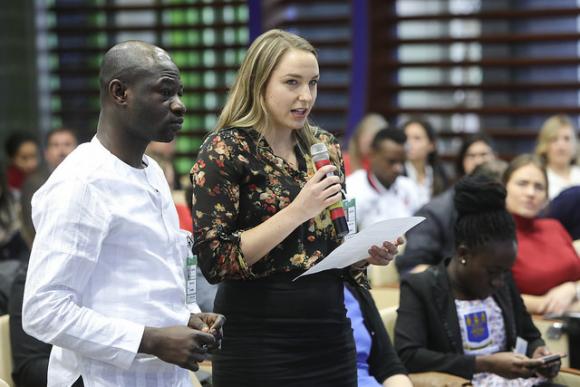A few days ago some 150 students from eight universities from around the world received Certificates of Appreciation for their tremendous contribution to the Student Interactive Session - Bringing Fresh Perspectives.

A few days ago some 150 students from eight universities from around the world received Certificates of Appreciation for their tremendous contribution to the Student Interactive Session - Bringing Fresh Perspectives.
The event which was held on 1-2 December 2016 in Rome Italy during the‘International Symposium on Sustainable Food Systems for Healthy Diets and Improved Nutrition aimed at building momentum for the UN’s Decade of Action on Nutrition (2016 to 2025) by bringing together various actors and stakeholders to explore policies and programs and share country experiences for shaping a systems approach for healthy diets and nutrition. Students and young researchers can play a major role in promoting the discourse in their own communities today as well as health and agricultural practitioners, leaders and decision-makers of the future. Therefore, the interactive online session connecting with them directly from different parts of the world was very useful.
The basic format was kept simple. As a first step, the eight participating universities webcast the Plenary Session and the Key Note Lecture from the Symposium as a ‘webinar’ in their own premises and it was attended by their faculty members and students. Then they organised a student-led discussion on the issues related to healthy diets and nutrition and how they impact their own community and country. A summary of their discussion with recommendations was prepared by each university and presented by their student representative at the interactive session to a panel of experts and policy makers. The students did not hesitate to present their views freely and the international experts answered their questions and shared their own experiences in an open and candid exchange. The university teachers played a big role to support the initiative and make it happen. The social media was also very active thanks to YPARD’s outreach and the strong networks of the participating universities.
This was the second time FAO had organised such as interactive session with YPARD. Earlier in 2016, during the International Symposium on the Role of Agricultural Biotechnologies in Sustainable Food Systems and Nutrition another group of seven universities had conveyed their key messages through an interactive session. Agriculture biotechnology is a cross-cutting subject and the key messages from the students covered many important aspects ranging from the current challenges and opportunities for food systems to the role of future policy makers with regards biotechnology. On both of these occasions, everyone recognized the commitment of the student community and their impatience with the pace of progress.
Looking ahead, few points are clear. First, online interactive sessions can be an effective way to open the space for dialogue and discussions with the young generation. Social media too can be channeled for insightful inputs on pertinent issues and policy related matters. Students welcome such two-way engagements both from the career perspective and for expanding their network. The academic community is also interested in creating new opportunities that stimulate engagement for the students with the global community. This alliance with YPARD is a win –win and can provide new avenues for future collaboration. Perhaps a joint approach can be used to interact about the targets set out for the Sustainable Development Goals and create a student–led ground swell for achieving these goals.
Blogpost by Dr. Kakoli Ghosh, Coordinator, Academia and Research Organisations, Partnerships, Advocacy and Capacity Development Division, Food and Agriculture Organization of the United Nations (FAO), Rome, Italy.
The views expressed are those of the author and do not necessarily reflect the views of the Food and Agriculture Organization of the United Nations (FAO).
Photo credit: FAO/Alessandra Benedetti

